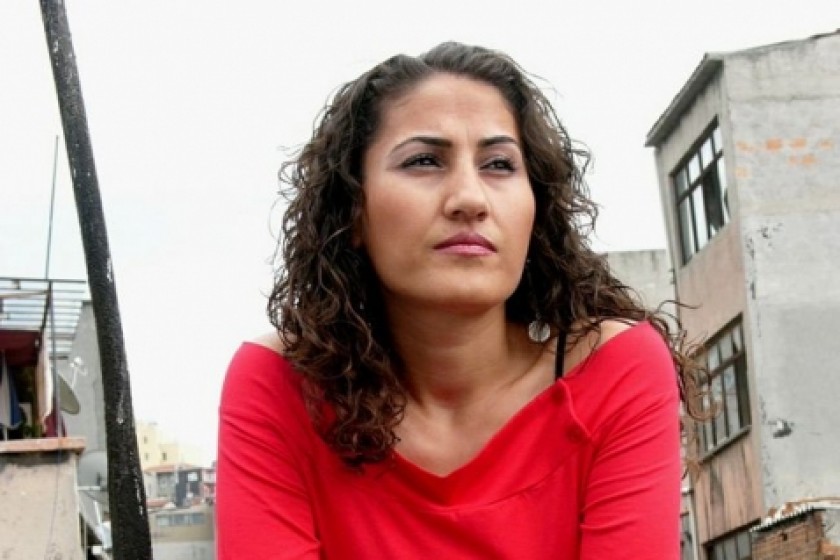
We’re all part of one big family and the loss of any one is tragic.
While visiting
Q - Where are your roots? Where do you hail from?
A - From the
Q - Do Armenians still live there?
A - Fragments exist in the form of Kurdisized Armenians. During the Genocide, the Kurds of Dersim protected the Armenians, sometimes exacting passage money, and guided them through the mountains to the Russian-controlled area on the other side. After long periods of living side by side most of these remaining Armenians eventually became Kurds as well in all but name. There are still villages that are solely inhabited by Armenians but they would never call themselves Armenian. But the surrounding Turks and Kurds know that they are Armenian.
Q - And where are your forefathers from?
A - Generally, Kurds belong to tribal clans. Our family didn’t have one so I can’t exactly pinpoint our origins. Who knows, perhaps my forefathers were Armenian too.
Q - When did you begin to sing?
A - I’ve been in
Q - And men and women pray together during the Alevi religious ceremony?
A - Alevis are not like other Muslims. The woman is the mother, the head of the family and is regarded as equal to the man. We have a custom; when a woman throws her headscarf to the ground that means putting an end to the matter, whether an argument, fight, etc. The woman has the final word.
Q - Given that Kurds still face problems in
A - There was a time when the Kurdish language was outlawed. Due to European pressure that prohibition has been lifted by law. The pressures started to lessen four or five years back. At least now we can perform in Kurdish before the public. But the government doesn’t assist us at all. On the contrary, it does whatever it can to hinder us. The Ministry of Culture still finds ways to put obstacles in the way of developing our cultural life. I’ve performed on the stages in various countries but have never given a one-woman concert in
Q - You also sing in Turkish, correct?
A - Yes, I aslo sing a few songs in Turkish. It’s the language I was brougt up on. But my identity, my internal world, is Kurdish.
Q - Who would you say your audience in
A - I sing Kurdish in the villages and small cities. I haven’t been able to give concerts in the larger cities. I am very well known outside
Q - Can you perform withouit difficulty in the villages?
A - Yes, but sometimes it’s quite a chore. You’d think I’m a terrorist or some such thing, the way I’m treated. I’m about to particiapte in a festival in Moush and the Police want copies of my residency papers, etc. I have to fill out certain forms and explain the reasons for performing before I can actually do so. In other words, the Interior Ministry must first give its OK before I can go and sing there.
Q - Does this mean then that you pose some perceived threat to the government?
A - In Turkey all ethnic groups pose some potential threat to the Turkish majority. Today, the fate of the Armenians and the Alevis is linked. They did it to the Armenians in the past. For the past thirty years they have been oppressing the Alevi community. Our villages have been drenched in blood. They set our villages ablaze and destroyed everything. They are continuing the same policies today.
Q - Where have you performed outside of
A - In Iraq, all over
Q - The songs in your repetoire, what are they about?
A - The Kurdish song is about war, love and sorrow. Generally speaking, Kurdish music is pretty diverse. Go to
Q - Have your relatives been victims of the repression?
A - Many have. I have lost many loved ones, especially in Dersim. I’m not just talking about blood relations, but friends and neighbors as well. We’re all part of one big family and the loss of any one is tragic.
Q - Aynur, is it possible to define culture as a means of struggle?
A - Very much so. Culture, song and literature are the strongest of fortresses from which to defend one’s identity. There are no Kurdish-language schools. If a people’s culture isn’t recognized as such under the law, it is proscribed and difficult to preserve. The language at least allows us to preserve our culture.
Q - As a cultural activist, what future do you see for
A -
I live in the Kurtulus, a heavily Armenian populated neighborhood of
Q- Do you ever intend to visit
A - Of course, if I ever get an invitation to go. I have already stated that I’d like to go and search out our Kurdish songs in your radio archives. This is the primary reason that I’d visit
 Videos
Videos Photos
Photos




Write a comment